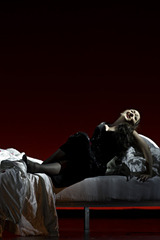by Steve Cohen
 I
never thought of Tannhäuser as a Christmas opera. Not like Hansel
und Gretel, or La Bohème where scenes took place on
Christmas Eve. Unlike Parsifal, which is performed on Good Friday
because Wagner wrote specifically about that day. Tannhäuser
rarely if ever was done at Christmas, even when it was much more popular
than it's been lately.
I
never thought of Tannhäuser as a Christmas opera. Not like Hansel
und Gretel, or La Bohème where scenes took place on
Christmas Eve. Unlike Parsifal, which is performed on Good Friday
because Wagner wrote specifically about that day. Tannhäuser
rarely if ever was done at Christmas, even when it was much more popular
than it's been lately.
I heard Tannhäuser broadcast on December 25 from Covent Garden. Intrigued by this timing, I realized how the opera is appropriate for the day; and, conversely, how one aspect of it is totally inappropriate. In this opera, Wagner celebrated the original essence of the religion, but he protested against the way it was interpreted in his time.
You will recall that the plot shows a knight who wants to leave Venus's kingdom of pleasures. Tannhäuser rejects eroticism and calls on the Virgin Mary for help, then makes a pilgrimage to Rome to seek absolution for his sins. There, the Pope rebuffs him, ruling that damnation awaits those who have enjoyed the pleasures of Venus and saying Tannhäuser could as soon be forgiven as the papal staff could break into flower. Tannhäuser collapses when he witnesses the death of the pure Elisabeth, whereupon a miracle occurs, the Pope's staff blossoms and Tannhäuser apparently will be welcomed into heaven.
The story seems sanctimonious. But one singer saw it as anti-Christian. The great tenor Jon Vickers prepared the title role in the 1970s, then precipitously withdrew because he decided that the opera was "blasphemous."
Now, Vickers was an intense man. In my years as a radio producer I interviewed two self-identified religious Christian singers who were vastly different from each other, Vickers and Jerome Hines. The latter was a committed man who refused to portray the devil on stage and who wrote his own opera about the life of Christ where he sang the title role. He cheerfully recognized other points of view. Vickers, on the other hand, was intimidating. I respected him, but it was easy to see why some folks thought the role of the crazed Peter Grimes was a natural for the argumentative Vickers. Still, he had a valid point.
Wagner created Tannhäuser as an embodiment of his own view that erotic, recreational love was permissible in tandem with spiritual love. His hero wanted to combine the sensual with the chaste. Personally, Wagner may not have lusted for any virgin - he preferred having affairs with married women - but he did want to combine his debauchery with a reputation as an upstanding public figure. Wagner's story in Tannhäuser, and in Tristan and the Ring, shows the composer repeatedly trying to justify his own indulgences in sexual pleasures.
In this opera, Wagner appealed to others whose activities were outside the accepted norm and who felt outlawed by their sexual choices. Oscar Wilde in The Picture of Dorian Gray, called Tannhäuser "a presentation of the tragedy of his own soul."
Counterbalancing this captivation for homosexuals, Wagner wrote orgiastic music for the scene between Tannhäuser and Venus. And Wagner's text is full of erotic word play, with puns about the hero being "in" and "penetrating" the hill of Venus. Baudelaire, the Parisian romantic poet, picked up on this and wrote admiringly about the "frenzied love" of the Venusberg scene.
Wagner agreed with Georg Wilhelm Hegel, the philosopher who developed a concept of mind and spirit full of contradictions that ultimately could be united and synthesized without eliminating either pole. Some theologians accept such compatibility. Ergo, erotic verses from The Song of Solomon used in services for the Virgin Mary, where sensual love was analogous to the love of God for his people. All these aspects give me renewed interest in the opera.
Tannhäuser appeals to me musically as well. It is early Wagner, with conventional scoring, but he kept revising it to include advances in his maturity. When Tannhäuser sings his hymn of praise to Venus he ambivalently changes keys, and he switches from Venus's E major to Elisabeth's key of E-flat. In Act 2, when he is trying to win Elisabeth's hand, he reprises that song in E major, so we hear him singing for Elisabeth but in the key of Venus. Thus Wagner demonstrates the confusion over the choice between erotic and religious.
The search for balance could apply, as well, to those of us who feel a tug between career and family, or between job responsibilities and diversionary hobbies, or between the attentions of a loved one and a desire for solitude. Wagner intuitively expressed the angst of a wide range of people.
Photo © Clive Barda